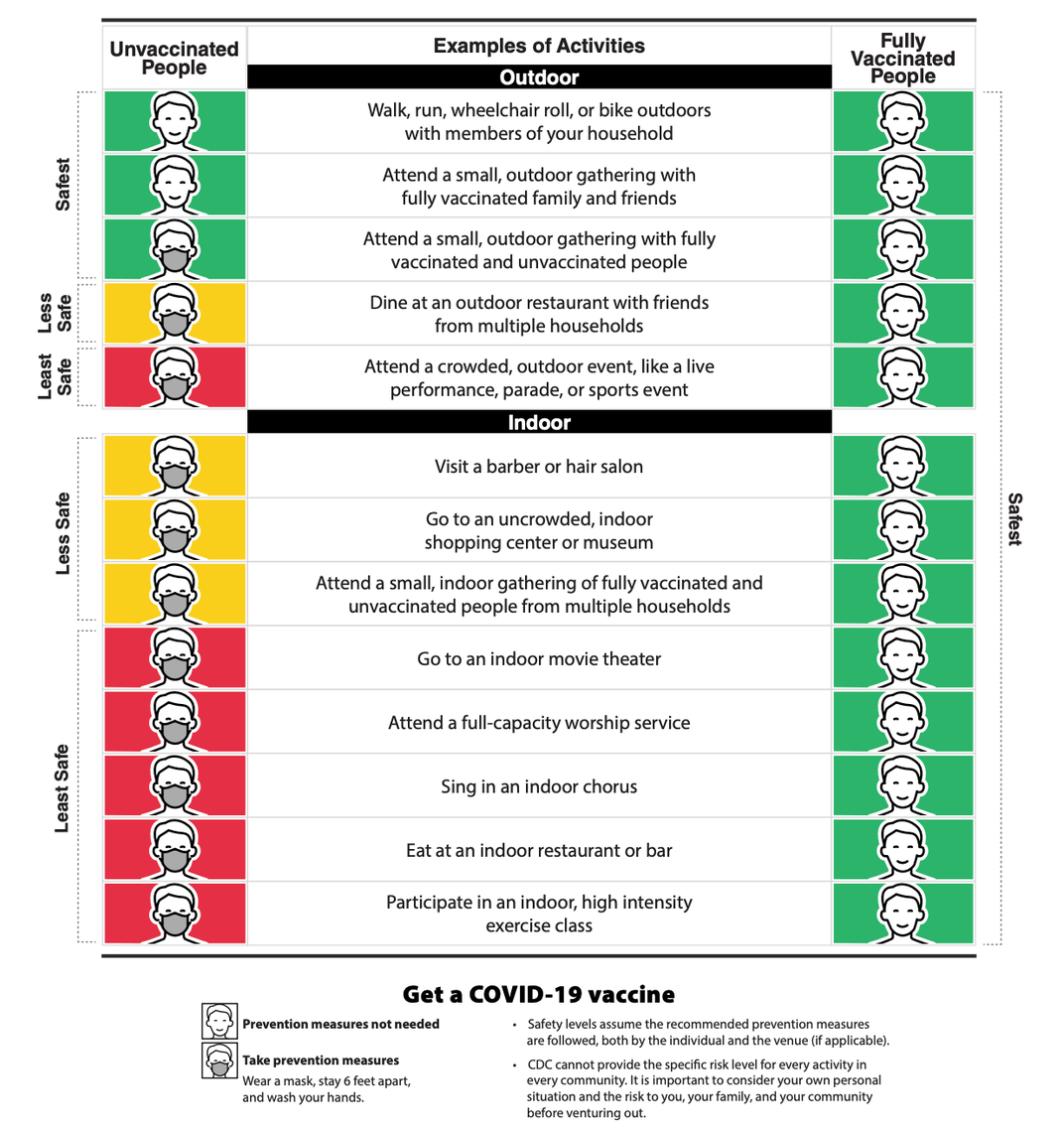New CDC Covid-19 Guidance Says Fully Vaccinated People Can Safely Go Maskless
In healthcare settings, mass transit, and where local laws require it, people should continue to wear masks
/https://tf-cmsv2-smithsonianmag-media.s3.amazonaws.com/filer/46/84/468424b0-7d58-402b-82b5-7a40cc26694b/gettyimages-1232884206.jpg)
According to the new recommendations from the Centers for Disease Control and Prevention, people who have been fully vaccinated against Covid-19 can safely return to most daily activities without wearing masks. The new guidance was announced on May 13.
At the end of April, the CDC released guidance that said fully vaccinated people could safely go outdoors without wearing masks; the new guidance expands on that to include most indoor activities. It’s up to states, local governments and individual businesses to decide how to incorporate CDC guidance into their rules about mask-wearing.

Experts say that the new guidance reflects recent scientific studies that have shown the vaccines are about 90 percent effective at preventing Covid-19 in real-world settings, Emma Platoff, Jeremy C. Fox and Christine Mui report for the Boston Globe. But the announcement surprised some epidemiologists, who expected mask-wearing to remain standard until more of the U.S. population was vaccinated, report Mitch Smith, Sarah Mervosh and Julie Bosman for the New York Times.
“The most important point is that the CDC is putting responsibility back on individuals. Each individual should look at what the CDC is recommending and see if that fits for them,” says University of California, Berkeley infectious disease specialist John Swartzberg to the Times.
Swartzberg plans to be unmasked outdoors and carry a mask to wear indoors while in public spaces. He adds to the Times that the new guidance “shows tremendous confidence in how well the vaccines work. The CDC does have data to support this decision. It’s not like they’re operating on the fly.”
Everyone over 16 years old in the United States became eligible for a Covid-19 vaccine on April 19, and this week, the first vaccine was approved for kids as young as 12. The vaccines developed by Pfizer/BioNTech and Moderna require two doses given three or four weeks apart respectively, and a person is considered fully vaccinated—has the most protection offered by the vaccine—two weeks after their second dose. The Johnson & Johnson vaccine is a single dose, so two weeks after that shot, a person is fully vaccinated.
"If you are fully vaccinated, you can start doing the things that you had stopped doing because of the pandemic," said CDC director Rochelle Walensky during the White House briefing on Thursday, report Elizabeth Cohen and John Bonifield for CNN. "We have all longed for this moment when we can get back to some sense of normalcy."
At this point, about a third of people in the U.S. have been fully vaccinated against Covid-19, and about 47 percent of people have received at least one dose, per the New York Times. In a short time, vaccines have become widely available in the country.
Joseph G. Allen, a public health expert at Harvard University, tells the Boston Globe that it is “absolutely . . . the right time” for the CDC guidance to change. He adds, “It’s a confusing time. We’ve known the playbook for a year, and the playbook feels like it’s shifting, and I recognize that can be uncomfortable to a lot of people, but it is based on sound science.”
The new guidance raises new questions. People living in households where not everyone is vaccinated, like households with young children, are not addressed even though previous guidelines included household considerations. And they do not give specific guidance for schools.
However, in healthcare settings and mass transit like planes and public transportation, the CDC recommends that people continue wearing masks. Local governments and businesses can also require people to wear masks.
Anthony Fauci, the director of the National Institute of Allergy and Infectious Diseases, said during the White House briefing that everyone who has been fully vaccinated may be ready to stop wearing masks right away, per CNN. There is a low risk of breakthrough infections of Covid-19, with mild symptoms, among people who are vaccinated.
"We have been doing this for 15 months at this point and not everybody's going to want to shed their masks immediately," says Walensky to NPR’s Laurel Wamsley. "It's going to take us a little bit of time to readjust."